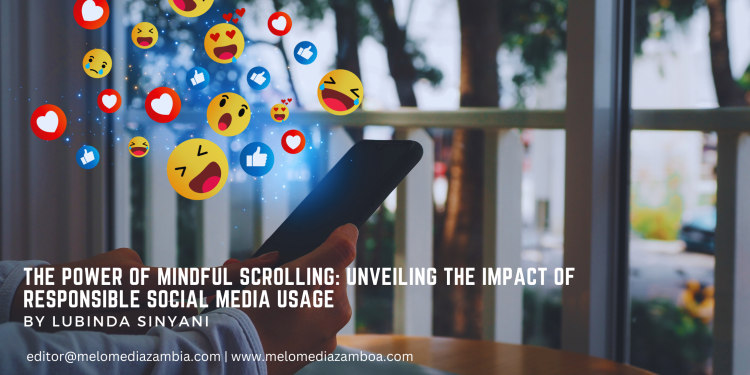By Lubinda Sinyani / Melo Media | Sunday, March 31, 2024 | Lusaka
In today’s digital age, it’s easy to get caught up in the endless scroll of social media. But what if we could use this powerful tool more mindfully? This article delves into the impact of responsible social media usage and the transformative potential it holds.
With the right approach, social media can be a force for good, fostering connection, inspiration, and enlightenment. By being conscious of our scrolling habits, we can navigate this digital landscape more intentionally and unleash its true potential.
Responsible social media usage means being aware of the effects it has on our mental health, as well as the wider societal implications. It involves being selective in the content we consume and share, engaging in meaningful conversations, and promoting positive interactions.
By adopting a mindful approach to social media, we can break free from the mindless scrolling and create a digital environment that uplifts and empowers us. It’s time to harness the power of our screens and use them as tools for personal growth, social change, and collective well-being.
Mindful scrolling is about being intentional with our social media usage. It’s about consciously choosing what content we engage with, how much time we spend on these platforms, and understanding the impact it has on our well-being. When we scroll mindfully, we are actively participating in the digital world rather than being passive consumers.
By becoming aware of our intentions behind using social media, we can begin to understand how it affects our thoughts, emotions, and overall mental health. Mindful scrolling is not about eliminating social media entirely but rather finding a balance that allows us to enjoy its benefits without falling into the trap of mindless scrolling.
Mindless scrolling can have detrimental effects on our mental health. Spending excessive time on social media can lead to feelings of comparison, inadequacy, and a distorted sense of reality. The constant exposure to carefully curated highlight reels of other people’s lives can leave us feeling anxious and unhappy with our own.
Moreover, mindless scrolling often leads to a waste of time and productivity. We may find ourselves mindlessly scrolling for hours, neglecting important tasks and activities that contribute to our personal growth and well-being. It becomes a vicious cycle where we seek temporary distraction and validation, only to end up feeling empty and unsatisfied.
On the other hand, mindful scrolling can bring numerous benefits to our lives. By curating our social media feeds to include content that inspires, educates, and uplifts us, we can create a digital environment that promotes personal growth and positivity. Mindful scrolling allows us to engage with content that aligns with our interests and values, fostering a sense of connection and belonging.
Additionally, social media can be a powerful tool for learning and self-improvement. By following thought leaders, experts, and activists in our areas of interest, we can gain valuable insights, expand our knowledge, and stay updated on current events. Mindful scrolling enables us to transform our social media experience into a valuable source of information and inspiration.
Practicing mindful scrolling involves adopting certain techniques to make our social media experience more intentional and positive. One technique is to set a specific time limit for social media usage and sticking to it. By allocating a fixed amount of time each day for scrolling, we can prevent it from becoming an endless and unproductive habit.
Another technique is to actively engage with the content we consume. Instead of mindlessly scrolling through posts, take the time to read, reflect, and respond. Engaging in meaningful conversations, leaving thoughtful comments, and sharing valuable content can contribute to a more positive and enriching social media experience.
Setting boundaries is crucial for practicing mindful scrolling. This can include establishing specific times when we are allowed to use social media and creating designated “tech-free” zones in our daily lives. By setting clear boundaries, we can prevent social media from encroaching on our personal relationships, work, and leisure time.
Creating a social media routine can also help us practice responsible usage. Rather than mindlessly scrolling whenever we have a free moment, we can allocate specific times during the day to engage with social media intentionally. This not only helps us manage our time more effectively but also prevents us from becoming overwhelmed or addicted to these platforms.
In recent years, several apps and tools have been developed to support mindful scrolling. These apps can help track our social media usage, set reminders for breaks, and even limit the amount of time we spend on certain platforms. By utilizing these tools, we can gain greater awareness of our habits and make conscious choices about how we use social media.
Some popular mindful scrolling apps include Moment, Offtime, and Forest. These apps provide insights into our screen time, encourage breaks, and even reward us for staying focused. By integrating these tools into our daily lives, we can develop healthier relationships with social media and ensure that it aligns with our values and goals.
Responsible social media usage goes beyond our personal habits and extends to the content we consume and share. It involves being critical of the information we encounter, fact-checking before sharing, and promoting positive interactions online. By being mindful of the impact our actions have on others, we can contribute to a more compassionate and responsible digital community.
Furthermore, responsible social media usage means being aware of the wider societal implications of our online activities. It involves supporting diverse voices, challenging harmful narratives, and using our platforms to advocate for social justice and positive change. By harnessing the power of social media, we can amplify marginalized voices and contribute to a more equitable and inclusive society.
Responsible social media usage has a profound impact on our mental health and well-being. By curating our feeds to include content that inspires and uplifts us, we can create a positive and supportive online environment. Surrounding ourselves with positivity can boost our mood, enhance our self-esteem, and cultivate a sense of belonging.
Moreover, responsible social media usage involves prioritizing our mental health and setting boundaries. By being mindful of how social media affects our emotions and well-being, we can take necessary steps to protect ourselves from negative influences. This may involve unfollowing accounts that trigger negative emotions, muting notifications, or taking regular breaks from social media altogether. To truly understand the power of mindful scrolling, it’s important to hear from individuals who have embraced this approach. Many people have shared stories of how adopting a more intentional and responsible approach to social media has transformed their lives. From finding inspiration and motivation to connecting with like-minded individuals, mindful scrolling has the potential to deeply im








































